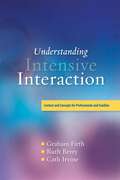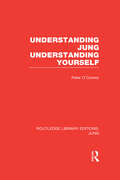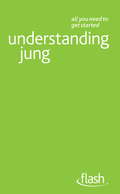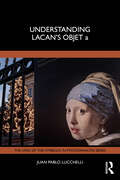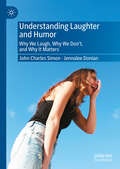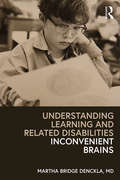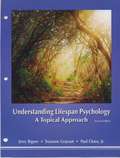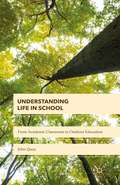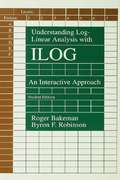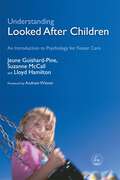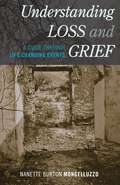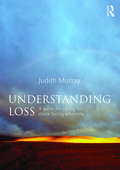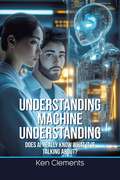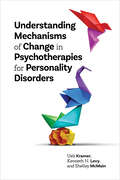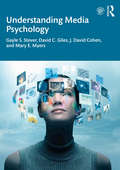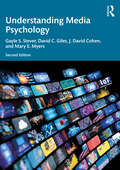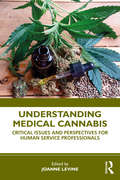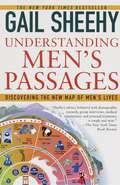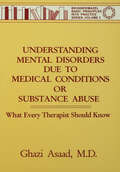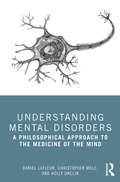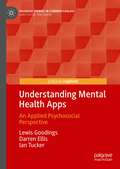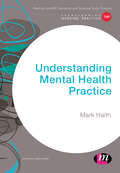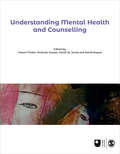- Table View
- List View
Understanding Intensive Interaction
by Graham Firth Ruth Berry Cath IrvineIntensive interaction is a valuable approach, with the potential to radically enhance the well-being of difficult-to-reach individuals, such as those with profound and severe learning disabilities, autistic spectrum conditions and emotional problems. This highly accessible book will help families and professionals develop a deeper understanding of this highly-successful approach and its associated issues, resulting in improved communication opportunities within a variety of care, therapeutic and educational settings. This compendium offers a multidisciplinary perspective to intensive interaction, bringing together the authors' experience and research from different disciplines. A glossary format and thematic structure are employed to enable readers to quickly access topics of interest, and gradually build on their understanding of the approach. Each chapter is devoted to an over-arching concept - including psychological theories of human behaviour, relationship building and maintenance and social inclusion - and illustrated with case studies to support theoretical assertions and offer practical examples of useful techniques. A useful reference and reflective tool, this book will interest both family and professional carers, support staff, special education teachers, learning disability nurses, social services practitioners, speech and language therapists, clinical psychologists, occupational therapists, or anyone who is interested in intensive interaction and wants to learn more.
Understanding Jung Understanding Yourself (Routledge Library Editions: Jung)
by Peter O'ConnorFirst published in 1985 this was the first introduction to Jung which related his theories to our everyday lives. Discover through this highly readable book that Jung’s views provide a full understanding of the concerns and anxieties of today. Sigmund Freud spoke to the generations who experienced the anxiety of sexual guilt and repression. Carl Jung speaks to our generation, who seek self-knowledge and a deeper understanding of life. This book outlines Jung’s theories and how we experience them in our personal relationships, marriages and dreams. It describes Jung’s eight psychological types and his thinking on the Self, alchemy, archetypes and the collective unconscious. Imperative for those who wish to gain insight into Jung and their own psyche.
Understanding Jung: Flash
by Ruth SnowdenThe books in this bite-sized new series contain no complicated techniques or tricky materials, making them ideal for the busy, the time-pressured or the merely curious. Understanding Jung is a short, simple and to-the-point guide to the life and work of Karl Jung. In just 96 pages, the reader will discover Jung's ideas about the psyche, the eight psychological types, and the interpretation of dreams. Ideal for the busy, the time-pressured or the merely curious, Understanding Jung is a quick, no-effort way to break into this fascinating topic.GRASP JUNG'S THEORIESUNDERSTAND ANALYTICAL PSYCHOLOGY EXPLORE HIS LIFEUNRAVEL COMPLEX THOUGHT
Understanding Jung: Flash
by Ruth SnowdenThe books in this bite-sized new series contain no complicated techniques or tricky materials, making them ideal for the busy, the time-pressured or the merely curious. Understanding Jung is a short, simple and to-the-point guide to the life and work of Karl Jung. In just 96 pages, the reader will discover Jung's ideas about the psyche, the eight psychological types, and the interpretation of dreams. Ideal for the busy, the time-pressured or the merely curious, Understanding Jung is a quick, no-effort way to break into this fascinating topic.GRASP JUNG'S THEORIESUNDERSTAND ANALYTICAL PSYCHOLOGY EXPLORE HIS LIFEUNRAVEL COMPLEX THOUGHT
Understanding Lacan's Objet a (The Lines of the Symbolic in Psychoanalysis Series)
by Juan Pablo LucchelliUnderstanding Lacan’s Objet a proposes that we modify the accepted approach to Lacan’s ideas and strive to make Lacanian concepts accessible.Juan Pablo Lucchelli gradually introduces conceptual tools, following the emergence of this ‘object of objects’ step by step. The book makes clear the impact of the social in the genesis of objet a as a concept, with the inevitable sharing of the subject’s being with others at its core. Lucchelli demonstrates that there can be no true autonomy of the individual without recognizing the dependence on the other; thus, like Winnicott’s transitional object, Lacan’s objet a is what connects us to others, despite the individualistic pretensions that emerge from the ego.This book will be essential reading both for Lacanian analysts in practice and in training, who wish to deepen their knowledge of the concept of the objet a, and for students of psychoanalysis, philosophy and psychology.
Understanding Laughter and Humor: Why We Laugh, Why We Don’t, and Why It Matters
by Jennalee Donian John Charles SimonThis book puts forward a revolutionary and comprehensive theoretical approach to understanding laughter and the humor we use to inspire it. This new perspective applies an evolutionary and biological lens through which we can fully appreciate these complex, universal human behaviors. It distinguishes itself from all classical and contemporary theories by revealing laughter&’s singular message, rather than simply its causes and effects, and makes clear why perceptions of vulnerability and status are ever-present in our conscious and subconscious thoughts. The theory underscores our innate desire to cooperate, our respect for those who compete fairly, and our disdain for those who do not. And it sheds light on the social dynamics governing human interactions, both positive and negative, by recognizing laughter not as a reflexive reaction to a certain class of stimuli, but as a vital form of nonverbal communication—not only for us, but for our great ape cousins as well.
Understanding Learning and Related Disabilities: Inconvenient Brains
by Martha Bridge DencklaChildren with developmental disabilities inhabit a gray zone: they live and learn under normal conditions in some aspects of their lives, while their "inconvenient brains" present a range of challenges in other school and life contexts. Dr. Martha Bridge Denckla provides parents and educators with general knowledge, research findings, and practical recommendations about a variety of these developmental conditions, including dyslexia, dyscalculia, ADHD, autism spectrum disorder, problems with motor coordination, and executive dysfunction. Inspired by her efforts to explain these conditions to parents over 45 years of clinical practice, she provides a science-based understanding of the issues in an accessible format. She uses the science of cognitive and behavioral neurology to help readers understand how the interrelationships of brain, environment, and behavior produce these developmental disorders, and to provide a basis for parenting and education programs based upon understanding how variations in brain development should guide plans for what is taught when to whom. Such developmentally appropriate, evidence-based, differentiated instruction within general education can diminish the demand for separate special education, and will thus serve all kinds of brains, whether "typical" or "inconvenient."
Understanding Life Span Psychology: A Topical Approach
by Troianne Grayson Jerry Bigner Paul CharaThe Dusk of Life </br> The Dawn of Development </br> Physical Development in Infancy & Childhood </br> Aging </br> Cognitive Development </br> Affective Development </br> Language and Personal Development </br> Sexual, Moral, and Spiritual Development </br> Social Development </br> The Field of Human Development
Understanding Life in School: From Academic Classroom to Outdoor Education
by John QuayAttending school is an experience that most people share but this leads us to accept rather than question the experience. Using the philosophies of Heidegger and Dewey, John Quay explores life in schools and juxtaposes the environment of a school camp with that of an academic classroom.
Understanding Log-linear Analysis With Ilog: An Interactive Approach
by Roger Bakeman Byron F. RobinsonWhenever data are categorical and their frequencies can be arrayed in multidimensional tables, log-linear analysis is appropriate. Like analysis of variance and multiple regression for quantitative data, log-linear analysis lets users ask which main effects and interactions affect an outcome of interest. Until recently, however, log-linear analysis seemed difficult -- accessible only to the statistically motivated and savvy. Designed for students and researchers who want to know more about this extension of the two-dimensional chi-square, this book introduces basic ideas in clear and straightforward prose and applies them to a core of example studies. ILOG -- a software program that runs on IBM compatible personal computers -- is included with this volume. This interactive program lets readers work through and explore examples provided throughout the book. Because ILOG is capable of serious log-linear analyses, readers gain not only understanding, but the means to put that understanding into practice as well.
Understanding Looked After Children: An Introduction to Psychology for Foster Care
by Suzanne Mccall Lloyd Hamilton Jeune Guishard-PineUnderstanding Looked After Children is an accessible guide to understanding the mental health needs of children in foster care and the role of foster carers and support networks in helping these children. The authors provide foster carers with an insight into the psychological issues experienced by children in the care system, and the impact of these issues on the foster family. Chapters cover cultural, social and legal structures associated with foster care and both the relevant child psychology theory and examples drawn from real-life situations. The authors give advice on how to address common psychological issues in collaboration with multi-agency professionals, as well as how to access to statutory services. They also explain the possible impact of assessments on foster children and the causes and management of foster carers' own feelings of frustration, anger or disappointment with social and mental health services or the placement itself. Chapters are complemented by case studies, and the book includes a helpful glossary to common terminology. Understanding Looked After Children is essential reading for registered foster carers and those considering fostering, as well as adoptive parents, and a useful reference for trainee and experienced practitioners in the care system, including social workers, psychologists, counsellors, teachers and others looking after vulnerable children.
Understanding Loss and Grief: A Guide Through Life Changing Events
by Nanette Burton MongelluzzoA comprehensive self-help book about the different kinds of loss we experience over a lifetime, and the sorrow that accompanies them. In this guide, psychotherapist Nanette Burton Mongelluzzo considers the different ways we experience loss and grief, in all their variations—whether through the actual death of a loved one, including a beloved pet, or losses experienced through such events as divorce, medical problems, and natural disasters—and examines what these experiences do to us psychologically, biologically, and emotionally. She also offers understanding and the needed tools for moving through the various experiences, both big and small. Everyone is touched by loss. It begins early in our lives and continues through many ages and stages. Through the use of real-life vignettes, and fascinating facts on loss and grief within the American cultural landscape, this book provides both insight and comfort.
Understanding Loss: A Guide for Caring for Those Facing Adversity
by Judith MurrayLoss and consequent grief permeates nearly every life changing event, from death to health concerns to dislocation to relationship breakdown to betrayal to natural disaster to faith issues. Yet, while we know about particular events of loss independently, we know very little about a psychology of loss that draws many adversities together. This universal experience of loss as a concept in its own right sheds light on so much of the work we do in the care of others. This book develops a new overarching framework to understand loss and grief, taking into account both pathological and wellbeing approaches to the subject. Drawing on international and cross-disciplinary research, Judith Murray highlights nine common themes of loss, helping us to understand how it is experienced. These themes are then used to develop a practice framework for structuring assessment and intervention systematically. Throughout the book, this generic approach is highlighted through discussing its use in different loss events such as bereavement, trauma, chronic illness and with children or older people. Having been used in areas as diverse as child protection, palliative care and refugee care, the framework can be tailored to a range of needs and levels of care. Caring for people experiencing loss is an integral part of the work of helping professions, whether it is explicitly part of their work such as in counselling, or implicit as in social work, nursing, teaching, medicine and community work. This text is an important guide for anyone working in these areas.
Understanding Machine Understanding: Does AI Really Know What It Is Talking About?
by Ken ClementsThis is a comprehensive and thought-provoking exploration of the nature of machine understanding, its evaluation, and its implications. The book proposes a new framework, the Multifaceted Understanding Test Tool (MUTT), for assessing machine understanding
Understanding Mechanisms of Change in Psychotherapies for Personality Disorders
by Kenneth N. Levy Ueli Kramer Shelley McMainThis book presents a holistic approach to treating patients with personality disorders that seeks to inspire psychotherapists and encourage innovation. Focusing on core mechanisms of change that span different therapeutic approaches, this book invites clinicians and researchers to join a dialogue with the authors, as they examine personality disorders from different theoretical perspectives, including dialectical behavior therapy, transference‑focused therapy, plan analysis, clarification‑oriented, and emotion‑focused therapies. The authors explore five functional domains that underlie assessment and treatment for personality disorders: emotion dysregulation, disturbed social interaction, identity problems, impulsivity, and cognitive disturbances. Each domain is analyzed through an in‑depth case example, with case conceptualizations and the careful evaluation of clinical decisions that must be made at key points in therapy. The authors then compare their different approaches, emphasizing commonalities among them while also pointing out notable differences. They also offer clear and compelling recommendations for maintaining and strengthening the therapeutic alliance. The final chapter synthesizes key takeaways from across the book to create a clear path towards enhancing clinical practice.
Understanding Media Psychology
by David C. Giles Gayle S. Stever J. David Cohen Mary E. MyersUnderstanding Media Psychology is the perfect introductory textbook to the growing field of media psychology and its importance in society, summarizing key concepts and theories to provide an overview of topics in the field. Media is present in almost every area of life today, and is an area of study that will only increase in importance as the world becomes ever more interconnected. Written by a team of expert authors, this book will help readers to understand the structures, influences, and theories around media psychology. Covering core areas such as positive media psychology, the effects of gaming, violence, advertising, and pornography, the authors critically engage with contemporary discussions around propaganda, fake news, deepfakes, and the ways media have informed the COVID-19 pandemic. Particular care is also given to addressing the interaction between issues of social justice and the media, as well as the effects media has on both the members of marginalized groups and the way those groups are perceived. A final chapter addresses the nature of the field moving forward, and how it will continue to interact with closely related areas of study. Containing a range of pedagogical features throughout to aid teaching and student learning, including vocabulary and key terms, discussion questions, and boxed examples, this is an essential resource for media psychology courses at the undergraduate and introductory master’s level globally.
Understanding Media Psychology
by David C. Giles Gayle S. Stever J. David Cohen Mary E. MyersUnderstanding Media Psychology is an authoritative introductory textbook on the growing field of media psychology. Providing an overview of topics in the field, it summarizes key concepts and theories and considers the importance of media psychology in today’s society.The second edition of this bestselling textbook has been fully updated to reflect the changing landscape of media psychology. The new edition features a brand-new chapter on news and political media, as well as increased focus on AI and new forms of social media. It covers core areas such as positive media psychology, audience research, and the effect of gaming, violence, advertising and pornography, critically engaging with contemporary discussions around propaganda, fake news, deepfakes, and how media and health psychology interacted during the COVID-19 pandemic and beyond. Written by a team of expert authors, this book will help readers understand the structures, influences, and theories around media psychology. Particular care is also given to addressing the interaction between issues of social justice and the media, as well as the effects media has on both the members of marginalized groups and how those groups are perceived. A student website and instructor resources provide further ways to engage with the content and support teaching and learning.Containing a range of pedagogical features throughout to aid teaching and student learning, including vocabulary and key terms, discussion questions, and boxed examples, this is an essential resource for media psychology courses at the undergraduate and introductory master’s levels globally.
Understanding Medical Cannabis: Critical Issues and Perspectives for Human Service Professionals
by Joanne LevineThis accessible text provides trainee human service providers and those currently working in the field with a comprehensive, cutting-edge overview of topics related to the medical and therapeutic use of cannabis. Employing an interdisciplinary, biopsychosocial framework, the book explores the different biological, cultural, and policy contexts of medical cannabis from a wide range of perspectives including practitioners, academics, and medical cannabis advocates. This book bridges the gap between theory and practice and underscores the urgent need for expanded and rigorous scientific research as medical cannabis is increasingly legalized, that may result in new cannabis-based medicines and help in identifying what health risks cannabis use may present. Chapters are both evidence-based and practical, weaving in learning objectives, review questions, and varied case examples, all of which will prepare students and professionals for the reality of working with medical cannabis consumers.
Understanding Men's Passages: Discovering the New Map of Men's Lives
by Gail SheehyHundreds of bold, imaginative men--celebrities as well as everyday heroes--share here their most intimate desires, deepest fears, and most fervent cravings for renewal. Decade by decade, Sheehy uncovers the real issues facing men today: finding new passion and purpose to invigorate the second half of their lives, dealing with "manopause," surviving job change, enjoying post-nesting zest, defeating depression, and learning what keeps a man young.
Understanding Mental Disorders Due To Medical Conditions Or Substance Abuse: What Every Therapist Should Know
by Ghazi AsaadThis text is a unique handbook that will heighten the awareness of all mental health professionals and students toward organic factors in mental illness.
Understanding Mental Disorders: A Philosophical Approach to the Medicine of the Mind
by Daniel Lafleur Christopher Mole Holly OnclinUnderstanding Mental Disorders aims to help current and future psychiatrists, and those who work with them, to think critically about the ethical, conceptual, and methodological questions that are raised by the theory and practice of psychiatry. It considers questions that concern the mind’s relationship to the brain, the origins of our norms for thinking and behavior, and the place of psychiatry in medicine, and in society more generally. With a focus on the current debates around psychiatry’s diagnostic categories, the authors ask where these categories come from, if psychiatry should be looking to find new categories that are based more immediately on observations of the brain, and whether psychiatrists need to employ any diagnostic categories at all. The book is a unique guide for readers who want to think carefully about the mind, mental disorders, and the practice of psychiatric medicine.
Understanding Mental Health Apps: An Applied Psychosocial Perspective (Palgrave Studies in Cyberpsychology)
by Darren Ellis Ian Tucker Lewis GoodingsThis is the first book to look exclusively from at the use of MHapps from an applied psychosocial perspective. Much of the academic literature on MHapps in psychology focuses on the clinical efficacy of using apps (e.g., depression reduction as result of using a certain app) and will typically report on the use of randomised controlled trials (or a similar method) to illustrate the use of apps as a tool for improving a psychological condition. Therefore, the main benefit of this book is that it recognises the impact of apps from a social perspective and will aim to show how everyday forms of distress are embedded in the use of these apps and the broader set of relations that constitute people’s everyday lives. The content of this book will identify how an applied social perspective can offer insight into the power of apps to shape our sense of ourselves and of others. This book will be of use to educators and students in psychology, sociology, health studies, media studies andcultural studies.
Understanding Mental Health Practice (Transforming Nursing Practice Series)
by Mark HaithMental health is a vast and fascinating subject but knowing where to begin can be challenging. This book focuses on the fundamentals of mental health care. It is packed full of ‘need-to-know’ information that will help students understand what is meant by mental health and wellbeing, be aware of the common mental health problems, as well as the typical interventions and treatment options available. The book focuses in on the most essential knowledge providing the ideal starting point for anyone looking to gain an initial understanding of mental health.
Understanding Mental Health and Counselling (Published in association with The Open University)
by Naomi Moller Andreas Vossler David W Jones David KaposiUnderstanding Mental Health and Counselling provides a critical introduction to key debates about how problems of mental health are understood, and to the core approaches taken to working with counselling and psychotherapy clients. In drawing out the differences and intersections between professional and social understandings of mental health and counselling theory and practice, the book fosters critical thinking about effective and ethical work with mental health service users and therapy clients. With chapters by noted academic writers and service-user researchers, and content enlivened by activities, first-person accounts and case material, the book provides a key resource for both counselling and psychotherapy trainees and those interested in the broader field of mental health.
Understanding Mental Health and Counselling (Published in association with The Open University)
by Naomi Moller Andreas Vossler David W Jones David KaposiUnderstanding Mental Health and Counselling provides a critical introduction to key debates about how problems of mental health are understood, and to the core approaches taken to working with counselling and psychotherapy clients. In drawing out the differences and intersections between professional and social understandings of mental health and counselling theory and practice, the book fosters critical thinking about effective and ethical work with mental health service users and therapy clients. With chapters by noted academic writers and service-user researchers, and content enlivened by activities, first-person accounts and case material, the book provides a key resource for both counselling and psychotherapy trainees and those interested in the broader field of mental health.
